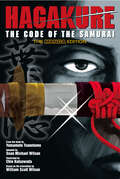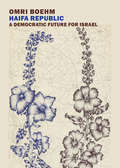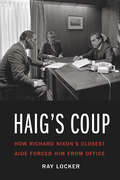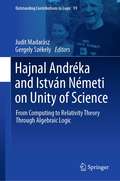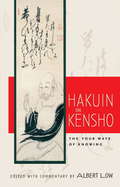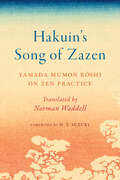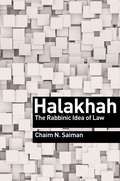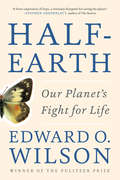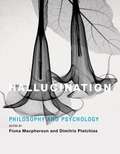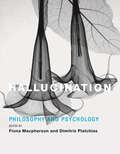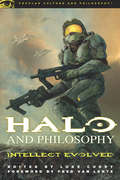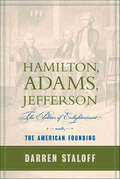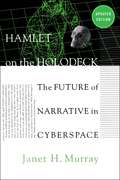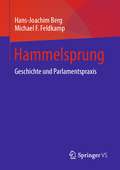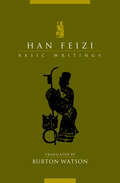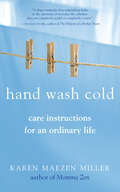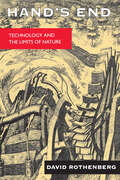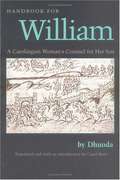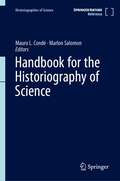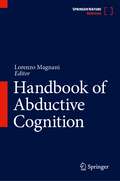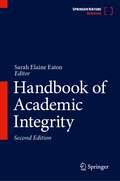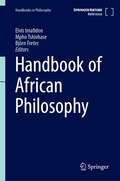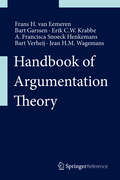- Table View
- List View
Hagakure: The Code of the Samurai (The Manga Edition)
by Yamamoto TsunetomoBased on William Scott Wilson's definitive translation, adapted by scriptwriter and comic book/manga author Sean Wilson, and with lively drawings by well-known illustrator Chie Kutsuwada, this first-ever graphic treatment of what's considered the most influential of all samurai treatises is sure to delight manga fans, martial arts enthusiasts, and students of Japanese culture.Reminiscent of The Arabian Nights in structure, Hagakure is a collection of tales and anecdotes that offer instruction and insight into the philosophy and code of behavior that foster the true spirit of Bushido—the Way of the Warrior. A young, upcoming samurai seeks the advice of an older, seasoned warrior who has become a Zen monk. The ambitious young samurai humbly begs to learn from the old master, who consents. So begins a series of eventful meetings.At each sitting. the master tells his young student tales of samurai past. Tales of famous warriors are recited, as well as ignoble gaffs. With brutal, unrelenting samurai justice, wrongs are righted and judgment is enacted. With each incident, the young novice learns what it means to be a samurai. Learns what courage and right thought are. Learns the harsh realities and subtle wisdom of his age.Writer Sean Wilson and illustrator Chie Kutsuwada both bring ample experience in the genre to this project. And, as an added bonus, William Scott Wilson, the translator of the original Kodansha International version of the book, provides an illuminating Afterword.
Haifa Republic: A Democratic Future for Israel
by Omri BoehmA provocative argument for a new way of seeing Israel, Zionism, and the two-state solution.Haifa Republic: A Democratic Future for Israel is an urgent wake-up call. The philosopher Omri Boehm argues that it is long past time to recognize that there will not be a two-state solution to the conflict between Israel and the Palestinian people. After fifty years, Israel&’s occupation of the West Bank constitutes annexation in all but name, even as the legitimate claims of the Arab population, soon to be a national majority, remain unaddressed. Meanwhile, daily life goes on under conditions rightly likened to apartheid. For liberals in Israel and America to continue to place their hopes in a two-state solution is a form of willful and culpable blindness, especially now that Israeli leaders across the political spectrum have begun to speak of ethnic cleansing. A catastrophe is in the making.But Haifa Republic also offers grounds for hope. Catastrophe can be averted, Boehm contends, by reconfiguring Israel as a single binational state in which Palestinians and Jews both possess human rights and equal citizenship. The original Zionists—Theodor Herzl, Ze&’ev Jabotinsky, and, early in his career, David Ben-Gurion—all advocated such a federation, and as prime minister, Menachem Begin successfully submitted a kindred plan to the Knesset. A binational federation offers a last chance for the two peoples who call Palestine home to live in peace and mutual respect and to have a truly democratic future in common.
Haig's Coup: How Richard Nixon's Closest Aide Forced Him from Office
by Ray LockerWhen General Alexander M. Haig Jr. returned to the White House on May 3, 1973, he found the Nixon administration in worse shape than he had imagined. President Richard Nixon, reelected in an overwhelming landslide just six months earlier, had accepted the resignations of his top aides—the chief of staff H. R. Haldeman and the domestic policy chief John Ehrlichman—just three days earlier. Haldeman and Ehrlichman had enforced the president’s will and protected him from his rivals and his worst instincts for four years. Without them, Nixon stood alone, backed by a staff that lacked gravitas and confidence as the Watergate scandal snowballed. Nixon needed a savior, someone who would lift his fortunes while keeping his White House from blowing apart. He hoped that savior would be his deputy national security adviser, Alexander Haig, whom he appointed chief of staff. But Haig’s goal was not to keep Nixon in office—it was to remove him. In Haig’s Coup, Ray Locker uses recently declassified documents to tell the true story of how Haig orchestrated Nixon’s demise, resignation, and subsequent pardon. A story of intrigues, cover-ups, and treachery, this incisive history shows how Haig engineered the “soft coup” that ended our long national nightmare and brought Watergate to an end.
Hajnal Andréka and István Németi on Unity of Science: From Computing to Relativity Theory Through Algebraic Logic (Outstanding Contributions to Logic #19)
by Judit Madarász Gergely SzékelyThis book features more than 20 papers that celebrate the work of Hajnal Andréka and István Németi. It illustrates an interaction between developing and applying mathematical logic. The papers offer new results as well as surveys in areas influenced by these two outstanding researchers. They also provide details on the after-life of some of their initiatives.Computer science connects the papers in the first part of the book. The second part concentrates on algebraic logic. It features a range of papers that hint at the intricate many-way connections between logic, algebra, and geometry. The third part explores novel applications of logic in relativity theory, philosophy of logic, philosophy of physics and spacetime, and methodology of science. They include such exciting subjects as time travelling in emergent spacetime. The short autobiographies of Hajnal Andréka and István Németi at the end of the book describe an adventurous journey from electric engineering and Maxwell’s equations to a complex system of computer programs for designing Hungary’s electric power system, to exploring and contributing deep results to Tarskian algebraic logic as the deepest core theory of such questions, then on to applications of the results in such exciting new areas as relativity theory in order to rejuvenate logic itself.
Hakuin on Kensho: The Four Ways of Knowing
by Albert LowKensho is the Zen experience of waking up to one's own true nature--of understanding oneself to be not different from the Buddha-nature that pervades all existence. The Japanese Zen Master Hakuin (1689-1769) considered the experience to be essential. In his autobiography he says: "Anyone who would call himself a member of the Zen family must first achieve kensho-realization of the Buddha's way. If a person who has not achieved kensho says he is a follower of Zen, he is an outrageous fraud. A swindler pure and simple." Hakuin's short text on kensho, "Four Ways of Knowing of an Awakened Person," is a little-known Zen classic. The "four ways" he describes include the way of knowing of the Great Perfect Mirror, the way of knowing equality, the way of knowing by differentiation, and the way of the perfection of action. Rather than simply being methods for "checking" for enlightenment in oneself, these ways ultimately exemplify Zen practice. Albert Low has provided careful, line-by-line commentary for the text that illuminates its profound wisdom and makes it an inspiration for deeper spiritual practice.
Hakuin's Song of Zazen: Yamada Mumon Roshi on Zen Practice
by Yamada Mumon RoshiRenowned modern Zen master Yamada Mumon Rōshi uses Hakuin&’s famous poem of spiritual realization, Song of Zazen, as a starting point to embark on a lively commentary on Zen practice in contemporary life.First published in Japan in 1962, Hakuin&’s Song of Zazen is a celebrated collection of short essays by Zen master Yamada Mumon Rōshi. Translated into English for the first time, it introduces the story of Hakuin&’s early life and training, then uses his classic Zen chanting poem, Song of Zazen, to make wide-ranging considerations of the Zen tradition and its applications in modern Japanese life. As Daisetz Suzuki remarks in his foreword, what gives Mumon&’s book its unique flavor and makes it different from previous works by Zen teachers are his forays into matters of ordinary, everyday life, expanding his Zen teaching to encompass interests that are closely linked with his lay audience. He responds to a news article that catches his eye in the morning paper, delivers criticism on contemporary political and social trends, explores matters as diversified as the uses of atomic energy, the court culture of seventeenth-century France, a leper hospital on an island in the Inland Sea, Albert Schweitzer and other noted Western figures—and more. In doing this Mumon gives readers open access to the opinions, judgements, and practical thinking of a leading Zen master—a map of his planet, so to speak. Each brief chapter of Mumon&’s book is an invitation to follow Hakuin and himself down the path of true Zen realization.
Halakhah: The Rabbinic Idea of Law (Library of Jewish Ideas #2)
by Chaim N. SaimanHow the rabbis of the Talmud transformed everything into a legal question—and Jewish law into a way of thinking and talking about everythingThough typically translated as “Jewish law,” the term halakhah is not an easy match for what is usually thought of as law. This is because the rabbinic legal system has rarely wielded the political power to enforce its many detailed rules, nor has it ever been the law of any state. Even more idiosyncratically, the talmudic rabbis claim that the study of halakhah is a holy endeavor that brings a person closer to God—a claim no country makes of its law.In this panoramic book, Chaim Saiman traces how generations of rabbis have used concepts forged in talmudic disputation to do the work that other societies assign not only to philosophy, political theory, theology, and ethics but also to art, drama, and literature. In the multifaceted world of halakhah where everything is law, law is also everything, and even laws that serve no practical purpose can, when properly studied, provide surprising insights into timeless questions about the very nature of human existence.What does it mean for legal analysis to connect humans to God? Can spiritual teachings remain meaningful and at the same time rigidly codified? Can a modern state be governed by such law? Guiding readers across two millennia of richly illuminating perspectives, this book shows how halakhah is not just “law” but an entire way of thinking, being, and knowing.
Half-Earth: Our Planet's Fight for Life
by Edward O. WilsonHalf-Earth proposes an achievable plan to save our imperiled biosphere: devote half the surface of the Earth to nature. In order to stave off the mass extinction of species, including our own, we must move swiftly to preserve the biodiversity of our planet, says Edward O. Wilson in his most impassioned book to date. Half-Earth argues that the situation facing us is too large to be solved piecemeal and proposes a solution commensurate with the magnitude of the problem: dedicate fully half the surface of the Earth to nature. If we are to undertake such an ambitious endeavor, we first must understand just what the biosphere is, why it's essential to our survival, and the manifold threats now facing it. In doing so, Wilson describes how our species, in only a mere blink of geological time, became the architects and rulers of this epoch and outlines the consequences of this that will affect all of life, both ours and the natural world, far into the future. Half-Earth provides an enormously moving and naturalistic portrait of just what is being lost when we clip "twigs and eventually whole braches of life's family tree." In elegiac prose, Wilson documents the many ongoing extinctions that are imminent, paying tribute to creatures great and small, not the least of them the two Sumatran rhinos whom he encounters in captivity. Uniquely, Half-Earth considers not only the large animals and star species of plants but also the millions of invertebrate animals and microorganisms that, despite being overlooked, form the foundations of Earth's ecosystems. In stinging language, he avers that the biosphere does not belong to us and addresses many fallacious notions such as the idea that ongoing extinctions can be balanced out by the introduction of alien species into new ecosystems or that extinct species might be brought back through cloning. This includes a critique of the "anthropocenists," a fashionable collection of revisionist environmentalists who believe that the human species alone can be saved through engineering and technology. Despite the Earth's parlous condition, Wilson is no doomsayer, resigned to fatalism. Defying prevailing conventional wisdom, he suggests that we still have time to put aside half the Earth and identifies actual spots where Earth's biodiversity can still be reclaimed. Suffused with a profound Darwinian understanding of our planet's fragility, Half-Earth reverberates with an urgency like few other books, but it offers an attainable goal that we can strive for on behalf of all life.
Hallucination: Philosophy and Psychology
by Fiona Macpherson Dimitris PlatchiasReflection on the nature of hallucination has relevance for many traditional philosophical debates concerning the nature of the mind, perception, and our knowledge of the world. In recent years, neuroimaging techniques and scientific findings on the nature of hallucination, combined with interest in new philosophical theories of perception such as disjunctivism, have brought the topic of hallucination once more to the forefront of philosophical thinking. Scientific evidence from psychology, neuroscience, and psychiatry sheds light on the functional role and physiology of actual hallucinations; some disjunctivist theories offer a radically new and different philosophical conception of hallucination. This volume offers interdisciplinary perspectives on the nature of hallucination, offering essays by both scientists and philosophers. Contributors first consider topics from psychology and neuroscience, including neurobiological mechanisms of hallucination and the nature and phenomenology of auditory-verbal hallucinations. Philosophical discussions follow, with contributors first considering disjunctivism and then, more generally, the relation between hallucination and the nature of experience. ContributorsIstvan Aranyosi, Richard P. Bentall, Paul Coates, Fabian Dorsch, Katalin Farkas, Charles Fernyhough, Dominic H. ffytche, Benj Hellie, Matthew Kennedy, Fiona Macpherson, Ksenija Maravic da Silva, Peter Naish, Simon McCarthy-Jones, Matthew Nudds, Costas Pagondiotis, Ian Phillips, Dimitris Platchias, Howard Robinson, Susanna Schellenberg, Filippo Varese
Hallucination: Philosophy and Psychology
by Fiona Macpherson Dimitris PlatchiasScientific and philosophical perspectives on hallucination: essays that draw on empirical evidence from psychology, neuroscience, and cutting-edge philosophical theory.Reflection on the nature of hallucination has relevance for many traditional philosophical debates concerning the nature of the mind, perception, and our knowledge of the world. In recent years, neuroimaging techniques and scientific findings on the nature of hallucination, combined with interest in new philosophical theories of perception such as disjunctivism, have brought the topic of hallucination once more to the forefront of philosophical thinking. Scientific evidence from psychology, neuroscience, and psychiatry sheds light on the functional role and physiology of actual hallucinations; some disjunctivist theories offer a radically new and different philosophical conception of hallucination. This volume offers interdisciplinary perspectives on the nature of hallucination, offering essays by both scientists and philosophers.Contributors first consider topics from psychology and neuroscience, including neurobiological mechanisms of hallucination and the nature and phenomenology of auditory-verbal hallucinations. Philosophical discussions follow, with contributors first considering disjunctivism and then, more generally, the relation between hallucination and the nature of experience. ContributorsIstván Aranyosi, Richard P. Bentall, Paul Coates, Fabian Dorsch, Katalin Farkas, Charles Fernyhough, Dominic H. ffytche, Benj Hellie, Matthew Kennedy, Fiona Macpherson, Ksenija Maravic da Silva, Peter Naish, Simon McCarthy-Jones, Matthew Nudds, Costas Pagondiotis, Ian Phillips, Dimitris Platchias, Howard Robinson, Susanna Schellenberg, Filippo Varese
Halo and Philosophy
by Luke CuddySince the Doom series, First Person Shooter (FPS) videogames have ricocheted through the gaming community, often reaching outside that community to the wider public. While critics primarily lampoon FPSs for their aggressiveness and on-screen violence, gamers see something else. Halo is one of the greatest, most successful FPSs ever to grace the world of gaming. Although Halo is a FPS, it has a science-fiction storyline that draws from previous award-winning science fiction literature. It employs a game mechanic that limits the amount of weapons a player can carry to two, and a multiplayer element that has spawned websites like Red vs. Blue and games within the game created by players themselves.Halo's unique and extraordinary features raise serious questions. Are campers really doing anything wrong? Does Halo's music match the experience of the gamer? Would Plato have used Halo to train citizens to live an ethical life? What sort of Artificial Intelligence exists in Halo and how is it used? Can the player's experience of war tell us anything about actual war? Is there meaning to Master Chief's rough existence? How does it affect the player's ego if she identifies too strongly with an aggressive character like Master Chief? Is Halo really science fiction? Can Halo be used for enlightenment-oriented thinking in the Buddhist sense? Does Halo's weapon limitation actually contribute to the depth of the gameplay? When we willingly play Halo only to die again and again, are we engaging in some sort of self-injurious behavior? What is expansive gameplay and how can it be informed by the philosophy of Michel Foucault? In what way does Halo's post-apocalyptic paradigm force gamers to see themselves as agents of divine deliverance? What can Red vs. Blue teach us about personal identity?These questions are tackled by writers who are both Halo cognoscenti and active philosophers, with a foreword by renowned Halo fiction author Fred Van Lente and an afterword by leading games scholar and artist Roger Ngim.
Hamilton versus Jefferson in the Washington Administration
by Carson HollowayBy the middle of 1792, just a little more than three years after America's new government under the Constitution had been set in motion, Alexander Hamilton and Thomas Jefferson - President George Washington's two most important cabinet secretaries and two of the most eminent men among the American founders - had become open and bitter political enemies. Their dispute was not personal but political in the highest sense. Each believed that the debate between them was over regime principles. Each believed that he was protecting the newly established republic, and that the other was laboring to destroy it. Carson Holloway's Hamilton versus Jefferson in the Washington Administration examines Hamilton and Jefferson's differences, seeking to explain why these great founders came to disagree so profoundly and vehemently about the political project to which both were committed and had dedicated so much thought and effort.
Hamilton, Adams, Jefferson: The Politics of Enlightenment and the American Founding
by Darren StaloffAn intellectual history of three Founding Fathers whose unique approaches to the Enlightenment helped shape America.American historian Darren Staloff delves into the political and intellectual lives of Alexander Hamilton, John Adams, and Thomas Jefferson to reveal how they embodied the collision of Europe’s grand Enlightenment project with the birth of a young nation. These three very different men each governed their public lives by Enlightenment principles. And the struggle for American independence would forever change their relationships to the politics of Enlightenment.Repeated humiliation on America’s battlefields banished Hamilton’s youthful idealism, leaving him a disciple of Enlightened realpolitik and the nation’s leading exponent of modern statecraft. After ten years in Europe’s diplomatic trenches, Adams’s embrace of the politics of Enlightenment became increasingly skeptical in spirit, and his public posture became increasingly that of the gadfly of his country. And Jefferson’s frustrations as a Revolutionary governor in Virginia led him to go beyond his Enlightened worldview, and articulate a new and radical Romantic politics of principle.Staloff demonstrates how each of these approaches helped shape America’s unique political identity. Because of the influence of these towering figures, Americans demand a government that is both modern, constrained by checks and balances, and capable of appealing to our loftiest aspirations while adhering to decidedly pragmatic policies.
Hamlet on the Holodeck
by Janet H. MurrayStories define how we think, the way we play, and the way we understand our lives. And just as Gutenberg made possible the stories that ushered in the Modem Era, so is the computer having a profound effect on the stories of the late 20th century. Today we are confronting the limits of books themselves -- anticipating the end of storytelling as we know it -- even as we witness the advent of a brave new world of cyberdramas. Computer technology of the late twentieth century is astonishing, thrilling, and strange, and no one is better qualified than Janet Murray to offer a breathtaking tour of how it is reshaping the stories we live by.Can we imagine a world in which Homer's Iyre and Gutenberg's press have given way to virtual reality environments like the Star Trek® holodeck? Murray sees the harbingers of such a world in the fiction of Borges and Calvino, movies like Groundhog Day, and the videogames and Web sites of the 1990s. Where is our map for this new frontier, and what can we hope to find in it? What will it be like to step into our own stories for the first time, to change our vantage point at will, to construct our own worlds or change the outcome of a compelling adventure, be it a murder mystery or a torrid romance? Taking up where Marshall McLuhan left off, Murray offers profound and provocative answers to these and other questions.She discusses the unique properties and pleasures of digital environments and connects them with the traditional satisfactions of narrative. She analyzes the state of "immersion," of participating in a text to such an extent that you literally get lost in a story and obliterate the outside world from your awareness. She dissects the titillating effect of cyber-narratives in which stories never climax and never end, because everything is morphable, and there are always infinite possibilities for the next scene. And she introduces us to enchanted landscapes populated by witty automated characters and inventive role-playing interactors, who together make up a new kind of commedia dell'arte. Equal parts daydream and how-to, Hamlet on the Holodeck is a brilliant blend of imagination and techno-wizardry that will provoke readers and guide writers for years to come.
Hammelsprung: Geschichte und Parlamentspraxis
by Hans-Joachim Berg Michael F. FeldkampIn diesem Buch wird die historische Entwicklung und Begriffsgeschichte des Hammelsprungs als eines der bemerkenswertesten sichtbaren Instrumente der Parlamentsarbeit seit dem 19. Jahrhundert dargestellt. Ferner wird gezeigt, dass die tatsächliche Handhabung des Hammelsprungs der ursprünglichen parlamentsrechtlichen Intention und modernen Funktionalität nicht mehr gerecht wird. Anträge in den Landesparlamenten von Bayern und Berlin schlagen eine Umkehr des bisherigen Auszählverfahrens vor. Danach soll die Zählung nicht erst bei Wiedereintritt in den Plenarsaal, sondern bereits beim Verlassen erfolgen.
Han Feizi: Basic Writings
by Burton WatsonTrenchant, sophisticated, and cynical, Han Feizi has been read in every age and is still of interest today when people are more than ever concerned with the nature and use of power. Han Feizi (280?-233 B.C.), a prince of Han, was a representative of the Fa-chia, or Legalist, school of philosophy and produced the final and most readable exposition of its theories. His handbook for the ruler deals with the problems of strengthening and preserving the state, the way of the ruler, the use of power, and punishment and favor. Ironically, the ruler most influenced by Han Feizi, the king of Qin, eventually sent Han Feizi to prison, where he later committed suicide.
Han Feizi: Basic Writings (Translations from the Asian Classics)
by Burton WatsonTrenchant, sophisticated, and cynical, Han Feizi has been read in every age and is still of interest today when people are more than ever concerned with the nature and use of power. Han Feizi (280?-233 B.C.), a prince of Han, was a representative of the Fa-chia, or Legalist, school of philosophy and produced the final and most readable exposition of its theories. His handbook for the ruler deals with the problems of strengthening and preserving the state, the way of the ruler, the use of power, and punishment and favor. Ironically, the ruler most influenced by Han Feizi, the king of Qin, eventually sent Han Feizi to prison, where he later committed suicide.
Hand Wash Cold: Care Instructions for an Ordinary Life
by Karen Maezen MiillerIt’s easy to think that meaning, fulfillment, and bliss are “out there,” somewhere outside of our daily routine. But in this playful yet profound reflection on awareness, the compelling voice of a contemporary woman reveals the happiness at the bottom of the laundry basket, the love in the kitchen sink, and the peace possible in one’s own backyard. Follow Karen Maezen Miller through youthful ambition and self-absorption, beyond a broken marriage, and into the steady calm of a so-called ordinary life. In her hands, household chores and caregiving tasks become opportunities for self-examination, lessons in relationship, and liberating moments of selflessness. With attention, it’s the little things — even the unexpected, unpleasant, and unwanted things — that count.
Hand's End: Technology and the Limits of Nature
by David RothenbergHand's End offers a new philosophy of technology as the fundamental way in which humans experience and define nature—the tool as humanity extended. Rothenberg examines human inventions from the water wheel to the nuclear bomb and discusses theories of technology in the thought of philosophers including Plato, Aristotle, Bacon, Marx, Heidegger, Spinoza, Mumford, and McLuhan.
Handbook For William: A Carolingian Women's Counsel For Her Son (Medieval Texts In Translation Series)
by Dhuoda Carol NeelSo wrote the Frankish noblewoman Dhuoda to her young son William in the middle of the ninth century. Intended as a guide to right conduct, the book was to be shared in time with William's younger brother. Dhuoda's situation was poignant. Her husband, Bernard, the count of Septimania, was away and she was separated from her children. William was by Charles the Bald as a guarantee of his father's loyalty, and the younger son's whereabouts were unknown. As war raged in the crumbling Carolingian Empire, the grieving mother, fearing for the spiritual and physical welfare of her absent sons, began in 841 to write her loving counsel in a handbook. Two years later she sent it to William. Handbook for William memorably expresses Dhuoda's maternal feelings, religious fervor, and learning. In teaching her children how they might flourish in God's eyes, as well as humanity's, Dhuoda reveals the authority of Carolingian women in aristocratic households. She dwells on family relations, social order, the connection between religious and military responsibility, and, always, the central place of Christian devotion in a noble life. One of the few surviving texts written by a woman in the Middle Ages, Dhuoda's Liber manualis was available in only two faulty Latin manuscripts until a third, superior one was discovered in the 1950s. This English translation is based on the 1975 critical edition and French translation by Pierre Riché. Now available for the first time in paperback, it includes an afterword written by Carol Neel that takes into account recent scholarship and the 1991 revised edition of Riché's text.
Handbook for the Historiography of Science (Historiographies of Science)
by Mauro L. Condé Marlon SalomonThis book aims to perform a critical and broad assessment of the historiography of science produced from the late nineteenth century to the early twenty-first century. It presents its main authors, concepts, ideas, conceptions, and schools. It also analyzes the historical circumstances of the rise of the discipline history of science and the relations of the historiography of science with related areas. These chapters do not understand the historiography of science as a mere description or record of the history of science. Instead, they understand the historiography of science from the epistemological criteria and choices that guided the writing of the history of science in its different contexts. In other words, more than describing the record of the various possibilities of historiographical approaches to science, the chapters carry out an epistemological reflection to assess the bases, possibilities, scope, and limits of different historiographical conceptions, authors, and traditions that have established the writing of the history of science. This book can be conceived as a reference work not only for professional historians and philosophers but also for academics from different backgrounds who are initiating themselves in the universe of history and philosophy of science, be they scientists from different fields or young researchers from different backgrounds who want to start studying the history and philosophy of science.
Handbook of Abductive Cognition
by Lorenzo MagnaniThis Handbook offers the first comprehensive reference guide to the interdisciplinary field of abductive cognition, providing readers with extensive information on the process of reasoning to hypotheses in humans, animals, and in computational machines. It highlights the role of abduction in both theory practice: in generating and testing hypotheses and explanatory functions for various purposes and as an educational device. It merges logical, cognitive, epistemological and philosophical perspectives with more practical needs relating to the application of abduction across various disciplines and practices, such as in diagnosis, creative reasoning, scientific discovery, diagrammatic and ignorance-based cognition, and adversarial strategies. It also discusses the inferential role of models in hypothetical reasoning, abduction and creativity, including the process of development, implementation and manipulation for different scientific and technological purposes. Written by a group of internationally renowned experts in philosophy, logic, general epistemology, mathematics, cognitive, and computer science, as well as life sciences, engineering, architecture, and economics, the Handbook of Abductive Cognition offers a unique reference guide for readers approaching the process of reasoning to hypotheses from different perspectives and for various theoretical and practical purposes. Numerous diagrams, schemes and other visual representations are included to promote a better understanding of the relevant concepts and to make concepts highly accessible to an audience of scholars and students with different scientific backgrounds.
Handbook of Academic Integrity
by Sarah Elaine EatonThe book brings together diverse views from around the world and provides a comprehensive overview of academic integrity and how to create the ethical academy. At the same time, the Handbook does not shy away from some of the vigorous debates in the field such as the causes of academic integrity breaches. There has been an explosion of interest in academic integrity in the last 20-30 years. New technologies that have made it easier than ever for students to ‘cut and paste’, coupled with global media scandals of high profile researchers behaving badly, have resulted in the perception that plagiarism is ‘on the rise’. This, in combination with the massification and commercialisation of higher education, has resulted in a burgeoning interest in the importance of academic integrity, how to safeguard it and how to address breaches appropriately. What may have seemed like a relatively easy topic to address – students copying sources without attribution – has in fact, turned out to be a complex, interdisciplinary field of research requiring contributions from linguists, psychologists, social scientists, anthropologists, teaching and learning specialists, mathematicians, accountants, medical doctors, lawyers and philosophers, to name just a few.Because of this broad interest and input, this handbook serves as the single authoritative reference work which brings together the vast, growing, interdisciplinary and at times contradictory body of literature. For both established researchers/practitioners and those new to the field, this Handbook provides a one-stop-shop as well as a launching pad for new explorations and discussions.
Handbook of African Philosophy (Handbooks in Philosophy)
by Elvis Imafidon Mpho Tshivhase Björn FreterThis Handbook provides in one volume rich, comprehensive and rigorous coverage of specific subject areas and thematic concerns in the ever-evolving academic discipline of African philosophy. This Handbook is unique in its focus on central and emerging areas within African philosophy such as Afro-communitarian philosophy, ethics, epistemology, social and political philosophy, existentialism, philosophy of religion, gender philosophy, philosophy of education, phenomenology, transhumanism, African philosophy futures, and philosophy of the non-human. The thirty-two chapters in this Handbook explore the rich textual and non-textual forms of philosophical knowledge in Africa and adequately represent the broad and diverse scope of African philosophy, showing the richness and depth of the philosophical tradition. This reference work is indispensable to students and researchers in African philosophy, comparative philosophy and world philosophies.
Handbook of Argumentation Theory
by Frans H. van Eemeren Bart Garssen Erik C. W. Krabbe A. Francisca Snoeck Henkemans Bart Verheij Jean H. M. WagemansThe Handbook Argumentation Theory provides an up to date survey of the various theoretical contributions to the development of argumentation theory for all scholars interested in argumentation, informal logic and rhetoric. It describes the historical roots of modern argumentation theory that are still an important theoretical background to contemporary approaches. Because of the complexity, diversity and rate of developments in argumentation theory, there is a real need for an overview of the state of the art, the main approaches that can be distinguished and the distinctive features of these approaches. The Handbook covers classical and modern backgrounds to the study of argumentation, the New Rhetoric developed by Perelman and Olbrechts-Tyteca, the Toulmin model, formal approaches, informal logic, communication and rhetoric, pragmatic approaches, linguistic approaches and pragma-dialectics. The Handbook is co-authored by Frans H. van Eemeren, Bart Garssen, Erik C. W. Krabbe, A. Francisca Snoeck Henkemans, Bart Verheij and Jean Wagemans, who are a coherent and prominent writing team whose expertise covers the whole field. The authors are assisted by an international Editorial Board consisting of outstanding argumentation scholars whose fields of interest are represented in the volume. "
